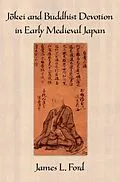This is the first book-length study in any language of Jo kei (1155-1213), a prominent Buddhist cleric of the Hosso (Yogacara) school, whose life bridged the momentous transition from Heian (794-1185) to Kamakura (1185-1333) Japan. "Kamakura Buddhism" has drawn notable scholarly attention, largely because it marks the emergence of new schools-Pure Land, Nichiren, and Zen-that came to dominate the Buddhist landscape of Japan. Although Jokei is invariably cited as one of the leading representatives of established Buddhism during the Kamakura period, he has been seriously neglected by Western scholars. In this book, James L. Ford aims to shed light on this pivotal and long-overlooked figure. Ford argues convincingly that Jokei is an ideal personage through which to peer anew into the socio-religious dynamics of early medieval Japan. Indeed, Jokei is uniquely linked to a number of decisive trends and issues of dispute including: the conflict between the established schools and Honen's exclusive nenbutsu movement; the precept-revival movement; doctrinal reform efforts; the proliferation of prominent "reclusive monks" (tonseiso); the escalation of fundraising (kanjin) campaigns and popular propagation; and the conspicuous revival of devotion toward Sákyamuni and Maitreya. Jokei represents a paradigm within established Buddhism that recognized the necessity of accessing other powers through esoteric practices, ritual performances, and objects of devotion. While Jokei is best known as a leading critic of Honen's exclusive nenbutsu movement and a conservative defender of normative Buddhist principles, he was also a progressive reformer in his own right. Far from defending the status quo, Jokei envisioned a more accessible, harmonious, and monastically upright form of Buddhism. Through a detailed examination of Jokei's extensive writings and activities, Ford challenges many received interpretations of Jokei's legacy and the transformation of Buddhism in early medieval Japan. This book fills a significant lacuna in Buddhist scholarship
Autorentext
James L. Ford is a Z. Smith Reynolds Fellow and Associate Professor in the Department of Religion at Wake Forest University where he teaches courses relating to East Asian religions. He holds a Master's in Theological Studies (M.T.S.) from Vanderbilt Divinity School (1992) and an M.A. and Ph.D. in East Asian religions from Princeton University (1998). Dr. Ford recently served for six years as executive secretary for the Society for the Study of Japanese Religion and currently serves as co-chair for the Japanese Religions Group of the American Academy of Religion.
Zusammenfassung
This is the first book-length study in any language of J kei (1155-1213), a prominent Buddhist cleric of the Hoss (Yogcra) school, whose life bridged the momentous transition from Heian (794-1185) to Kamakura (1185-1333) Japan. "e;Kamakura Buddhism"e; has drawn notable scholarly attention, largely because it marks the emergence of new schools-Pure Land, Nichiren, and Zen-that came to dominate the Buddhist landscape of Japan. Although Jkei is invariably cited as one of the leading representatives of established Buddhism during the Kamakura period, he has been seriously neglected by Western scholars. In this book, James L. Ford aims to shed light on this pivotal and long-overlooked figure. Ford argues convincingly that Jkei is an ideal personage through which to peer anew into the socio-religious dynamics of early medieval Japan. Indeed, Jkei is uniquely linked to a number of decisive trends and issues of dispute including: the conflict between the established schools and Hnen's exclusive nenbutsu movement; the precept-revival movement; doctrinal reform efforts; the proliferation of prominent "e;reclusive monks"e; (tonseis); the escalation of fundraising (kanjin) campaigns and popular propagation; and the conspicuous revival of devotion toward kyamuni and Maitreya. Jkei represents a paradigm within established Buddhism that recognized the necessity of accessing other powers through esoteric practices, ritual performances, and objects of devotion. While Jkei is best known as a leading critic of Hnen's exclusive nenbutsu movement and a conservative defender of normative Buddhist principles, he was also a progressive reformer in his own right. Far from defending the status quo, Jkei envisioned a more accessible, harmonious, and monastically upright form of Buddhism. Through a detailed examination of Jkei's extensive writings and activities, Ford challenges many received interpretations of Jkei's legacy and the transformation of Buddhism in early medieval Japan. This book fills a significant lacuna in Buddhist scholarship
